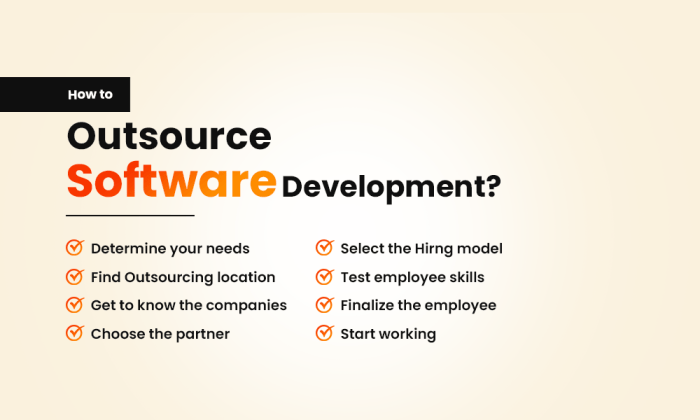In today’s dynamic business landscape, startups face immense pressure to innovate rapidly and efficiently. Developing robust software is often crucial for achieving this, but building an in-house development team can be expensive, time-consuming, and resource-intensive. This is where outsourced software development emerges as a compelling solution. This comprehensive guide explores the intricacies of outsourcing software development for startups, providing a detailed overview of its benefits, challenges, and best practices.
Understanding Outsourced Software Development
Outsourced software development involves contracting a third-party company or individual to handle all or part of your software development project. This can range from designing and developing the entire application to focusing on specific aspects like front-end development, back-end development, testing, or maintenance. Startups leverage outsourcing to access specialized skills, reduce costs, and accelerate time-to-market.
Outsourcing software development offers startups significant cost and time advantages, allowing them to focus on core business strategies. However, protecting sensitive data during this process is crucial; consider using robust security measures like the best hard disk encryption software to safeguard intellectual property shared with your development team. This ensures your startup maintains a secure foundation as it scales and grows.
Types of Outsourcing Models
- Nearshore Outsourcing: Engaging a company in a geographically close region, often sharing similar time zones and cultural backgrounds (e.g., a US startup outsourcing to a company in Mexico or Canada).
- Offshore Outsourcing: Contracting with a company in a distant country, often with significant time zone differences (e.g., a US startup outsourcing to a company in India or Ukraine).
- Onshore Outsourcing: Hiring a development team within the same country as the startup.
Benefits of Outsourcing Software Development for Startups
Outsourcing offers numerous advantages for startups, making it a popular choice for bootstrapped businesses and those seeking rapid growth:
Cost Savings
- Reduced overhead: Startups avoid the expenses associated with hiring, training, and equipping an in-house team, including salaries, benefits, office space, and equipment.
- Access to competitive pricing: Outsourcing companies often offer competitive rates, especially in regions with lower labor costs.
Access to Specialized Expertise
- Tap into a global talent pool: Outsourcing provides access to skilled developers with specialized expertise in various technologies and programming languages.
- Focus on core competencies: Startups can concentrate on their core business functions while outsourcing the development work to experts.
Faster Time-to-Market
- Accelerated development cycles: Experienced outsourcing teams can often deliver projects faster than in-house teams, enabling quicker product launches.
- Scalability and flexibility: Outsourcing allows startups to easily scale their development efforts up or down as needed, adapting to changing project requirements.
Increased Efficiency and Productivity
- Dedicated development teams: Outsourcing companies provide dedicated teams focused solely on the startup’s project.
- Improved project management: Reputable outsourcing companies employ robust project management methodologies to ensure efficient workflow and timely delivery.
Challenges of Outsourcing Software Development
While outsourcing offers numerous advantages, startups should be aware of potential challenges:

Communication Barriers
- Language differences: Misunderstandings can arise due to language barriers, especially when working with offshore teams.
- Time zone differences: Coordinating communication and meetings across different time zones can be challenging.
Quality Control
- Maintaining quality standards: Ensuring the outsourced team meets the required quality standards requires careful planning and rigorous testing.
- Risk of intellectual property theft: Startups need to protect their intellectual property through robust contracts and security measures.
Managing the Relationship
- Building trust and rapport: Effective communication and collaboration are crucial for building a strong working relationship with the outsourced team.
- Contract negotiation and management: Startups need to carefully negotiate contracts to protect their interests and ensure clear deliverables.
Choosing the Right Outsourcing Partner
Selecting the right outsourcing partner is crucial for the success of the project. Consider the following factors:
Experience and Expertise
- Relevant industry experience: Look for companies with proven experience in your industry and with projects similar to yours.
- Technical expertise: Ensure the team possesses the necessary skills and experience in the technologies you require.
Communication and Collaboration
- Clear communication channels: Choose a partner with effective communication strategies and readily available project managers.
- Cultural compatibility: Consider the cultural differences and ensure seamless collaboration.
Project Management Methodology
- Agile development: Agile methodologies offer flexibility and adaptability, ideal for startups.
- Project tracking tools: Ensure the outsourcing partner uses project management tools for transparency and progress tracking.
Security and Confidentiality
- Data security measures: Verify the outsourcing partner’s data security protocols and compliance certifications.
- Non-disclosure agreements (NDAs): Establish clear NDAs to protect your intellectual property.
Best Practices for Outsourcing Software Development
To maximize the benefits of outsourcing, follow these best practices:

- Clearly define project requirements: Develop a comprehensive project scope document outlining all requirements and specifications.
- Establish clear communication protocols: Set up regular communication channels and meeting schedules.
- Implement rigorous quality control measures: Establish testing procedures and quality assurance processes.
- Monitor progress regularly: Track project milestones and address any issues promptly.
- Build strong relationships: Foster open communication and collaboration with the outsourcing team.
Frequently Asked Questions (FAQ)
- Q: How much does outsourced software development cost? A: Costs vary greatly depending on factors like project complexity, team size, location, and technology used. Get multiple quotes to compare.
- Q: How do I choose the right outsourcing model (Nearshore, Offshore)? A: Consider factors like budget, time zone differences, language barriers, and the need for in-person meetings.
- Q: How can I protect my intellectual property when outsourcing? A: Use strong NDAs, secure code repositories, and choose reputable partners with robust security measures.
- Q: What are the key risks of outsourcing? A: Potential risks include communication barriers, quality control issues, and intellectual property theft. Mitigation strategies are crucial.
- Q: How do I manage communication with an offshore team? A: Utilize project management tools, schedule regular video conferences, and establish clear communication protocols.
Conclusion
Outsourcing software development can be a highly effective strategy for startups seeking to accelerate growth, reduce costs, and access specialized expertise. By carefully selecting a reputable outsourcing partner, establishing clear communication channels, and implementing robust quality control measures, startups can significantly enhance their chances of success. Remember to thoroughly research potential partners, negotiate contracts carefully, and maintain open communication throughout the development process.
References
- Toptal (for freelance developers and teams)
- Clutch (for finding and vetting outsourcing companies)
- Upwork (for finding freelance developers)
Call to Action
Ready to leverage the power of outsourced software development for your startup? Contact us today for a free consultation and let’s discuss your project needs!

